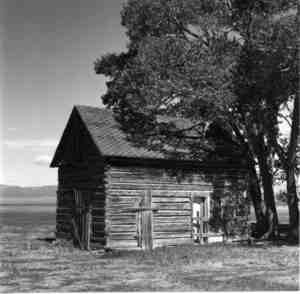Column by George Sibley
John Locke -March 2006 -Colorado Central Magazine
At Western’s Water Workshop last summer, Justice Greg Hobbs of the Colorado Supreme Court, dropped what struck me then, and still strikes me, as a bombshell. Where water in the West is concerned, he said, “we are no longer developing a resource; we are learning to share a developed resource.”
Justice Hobbs –last mentioned in Colorado Central, I think, for the poetry he writes rather than the opinions he delivers –was speaking at the conclusion of the conference, following a half-day workshop exploring the potential challenges latent in the “Colorado Water for the 21st Century Act,” last year’s House Bill 1177. What 1177 did was try to insert into Colorado’s court-oriented water adjudication process a new step for more general intrabasin and interbasin discussion and negotiation about water development and allocation.
The nine intrabasin “Roundtables” established by HB 1177 are now meeting around the state, mostly in what could be described as an atmosphere of “skeptical hope.” Each Roundtable has designated two representatives to an “Interbasin Compact Committee” (IBCC) which is now working on developing a charter for what amounts to the development of win-win scenarios for potential future transbasin water diversions –thus, we hope, transforming what we in the mountain valleys are more accustomed to calling “Front Range water grabs.”
The whole process is being driven mostly by the enormous energy and public vision of Russell George, scion of a Rifle ranch family, a longtime state legislator, now the director of Colorado’s Department of Natural Resources, and, in my opinion, one of the best “public servants” the West has seen in a long time. As we rough-sort politicians today, he is a Republican, but he is to Republicans what Senator Ken Salazar is to Democrats; they are both farmers by heritage and thus a little too close to the earth to participate in the esoteric ideologica of party lines.
A few years ago, I wrote here about an Arizona rancher, William McDonald, who, in a presentation at the college, called for the creation of a political “radical center,” which would eschew the “extreme rhetoric and extreme actions” growing out of a “black and white, us against them” media-staged confrontation whose “antagonists have been identified as ‘ranchers vs. environmentalists’ or ‘extractionists vs. conservationists.'”
“What is being lost in the rhetoric,” McDonald said, “is the only thing that matters –the eventual consequences for the land.” And he was walking his talk about the “radical center” with a group of other ranchers, environmentalists and public land managers down in the “Malpai Borderlands,” working out a very progressive collective management process for what amounted to a huge, fragile desert ecosystem stretching into two states and Mexico.
Russ George tries to work that same center, and the HB 1177 processes are about as radical as the center gets in Colorado. Because what we are going to be dealing with, in both intrabasin visions and interbasin negotiations, is what happens when a society based on “appropriation from the commons” runs out of a commons to appropriate from.
Colorado’s “appropriation doctrine” for water, like the Homestead Act for land, was grounded in some heavy finagling in England as that nation struggled to adapt medieval practices to the “early globalism” that was transforming Europe between the 15th and 17th centuries C.E. In medieval Europe, everything basically belonged to the King (who was presumed to be divinely ordained by God), and the King parceled out enough land to the other strong men in the kingdom to keep them happy, he hoped; and they in turn let the commoners work the land in return for the lion’s share of what the land yielded.
But as the world of “global trade” opened up in the 15th century, and the world slouched toward industrial production to produce trade goods, the big landholders began to “enclose” the land, evicting the commoners from their plots and commons in order to convert the land to more industrial production of raw resources like fibers and grains.
John Locke, a 17th-century thinker whose gift was the ability to articulate what the powerful were doing in a way that made it seem like the will of God, articulated the idea of “appropriation from the commons.” First, God gave everything to all of us, he said. But when an individual adds his personal labor to something that God gave us all –as when he plucks an apple from “our” tree –then his labor makes that apple his apple. His property, appropriated from the commons. Through an intricate and labyrinthian process of word-mongering, Locke nudged this beyond the old principle of “usufruct,” whereby the apple-plucker “owned” just the apple, on to enabling him to claim, through his labors on their behalf, the tree and the ground it grew out of too.
Even then, Locke recognized the dilemma that would arise when there might not be any more commons from which a willing laborer could appropriate property (which he listed with “life” and “liberty” in the inalienable rights of man). But the civilized world was still kind of besotted by the apparent infinitude of the Americas, where even a century later his American disciple, Thomas Jefferson, would figure that there would be enough land forever for his yeoman farmers to homestead, thus assuring the dominance of a decentralized democratic republic against the centralizing massifying forces of industrialism and urbanization. Locke’s summary of that hope: “In the beginning all the world was America.”
Locke is almost transcribed directly into the Colorado Constitution. Section 5 of Article XVI says that “the water of every natural stream, not heretofore appropriated, within the state of Colorado, is hereby declared to be the property of the public, and the same is dedicated to the use of the people of the state.” But the very next section says, “The right to divert the unappropriated waters of any natural stream to beneficial uses shall never be denied.” And while it is not explicit in the Constitution, this has been interpreted for well over a century to create a property right –a marketable property right –for whoever invests his labor in diverting those waters; if you were using it first, you have a property in that use that you can sell to another would-be user.
So in what sense is water “the property of the public …. dedicated to the use of the people”? Well, so long as there was still water to appropriate from the commons, for those who needed or wanted it, “the people” of any community or group could get in there and dig alongside the individuals who sort of make up “the people,” and that question could be deferred.
But now, whether the waters of the state are totally developed or not is an argument akin to the number of angels that can stand on the head of a pin; the fact is that water is being bought up, at pretty incredible prices, by semi-desperate communities. And all any individual seller of water has to show is that the sale and removal of his water will not injure any other individual water right holders in his watershed.
But what of “the people” to whom the use of the waters of our state are “dedicated”? And what about the farm community whose businesses –and whole culture –depended upon what used to be watered by those individual sellers of water? Who covers the community’s injury, and how?
“We are no longer developing a resource. We are learning to share a developed resource.” The implications there plow deep in our society. “Private property” and “sharing” are not automatically compatible concepts. But they aren’t automatically incompatible either. Most of us would rather not have to deal with sorting it out –better to just find another undeveloped America somewhere. But that ain’t gonna happen. And that’s how radical the center is: that HB 1177 is trying to get us all to sit down together to talk things through. It’s a challenge worthy of an intelligent society, if we can measure up to it.


